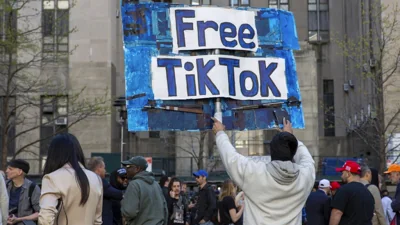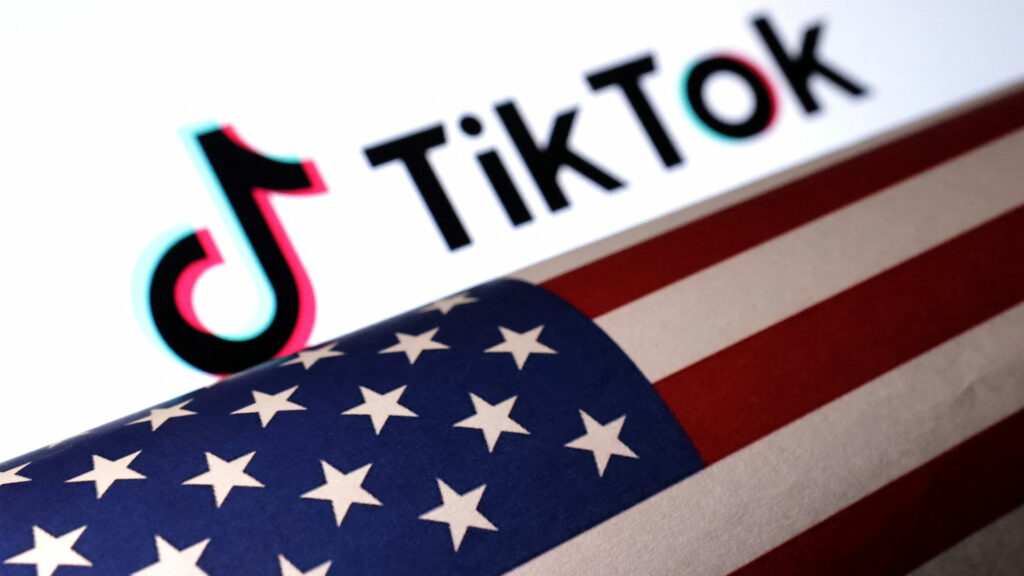TikTok claims that a prospective ban on its app in the US would “trample the free speech” of 170 million Americans.
The US House of Representatives voted on Saturday to ban TikTok unless the app’s owner cuts connections with China.

The legislation was part of a US foreign policy package that included help for Ukraine and may become law as soon as next week.
In recent months, US officials have expressed concern over TikTok’s appeal among young people.
They claim TikTok’s owner, Bytedance, is subordinate to Beijing, something it has often rejected.
READ MORE: US Congress Presses Ahead With Bill To Pressure TikTok’s Chinese Owner To Sell
The TikTok legislation was part of a package adopted by lawmakers that will provide $61 billion (£49 billion) in foreign aid to Ukraine, as well as money to Israel and Taiwan.
The House of Representatives voted first on TikTok’s future, passing the modified divest-or-ban law by 360 to 58.
The Senate is set to vote on the bill next week, and US President Joe Biden has previously stated that he will sign it.
If the bill passes, Bytedance will have nine months to sell its stake – with a possible three-month extension while the transaction is underway – or face a ban.

A TikTok representative condemned the bill, claiming it “would trample the free speech rights of 170 million Americans, devastate seven million businesses, and shutter a platform that contributes $24 billion (£19.4 billion) to the US economy annually.”
According to TikTok, ByteDance “is not an agent of China or any other country”. And ByteDance says it is not a Chinese company, citing the many global investment groups that own 60% of it.
The US House of Representatives voted in March to give ByteDance six months to sell TikTok to non-Chinese owners or disable the app in the US, but the law is currently awaiting Senate approval.
ByteDance, founded in 2012 by Chinese entrepreneurs, first achieved success with the short video app Douyin in China. A year later, it introduced TikTok, an international version.

The social media app was prohibited in China yet grew to a billion users in five years.
It is now managed by a limited liability corporation based in Los Angeles and Singapore, but it is primarily owned by ByteDance.
While its founders own only 20% of ByteDance, they have the majority share in the company. Institutional investors own around 60%, including prominent US investment firms including General Atlantic, Susquehanna, and Sequoia Capital.
READ MORE: Mike Pence Launches $2 Million Ad Campaign To Push TikTok Ban Through The Senate
The remaining 20% is held by employees worldwide. Three of the board’s five members are American.
However, Beijing’s growing grasp on private enterprises has raised concerns in the United States about the Chinese Communist Party’s control over ByteDance and the data it holds.

China dismisses these fears as American paranoia, warning that a TikTok ban will “inevitably come back to bite the US”.
To address security concerns, TikTok has routed all US customers’ data through the Texas-based software firm Oracle since 2022.
TikTok has stated that US data will be ringfenced and housed on Oracle servers in the US.
Before Saturday’s vote, Democratic Congressman Raja Krishnamoorthi told the BBC’s World Business Report that they want the app to continue.
“I think that it still has a lot of good content,” he added. “But most important thing is that it’s not under the control or operation of an adversary country.”
Radiant TV, offering to elevate your entertainment game! Movies, TV series, exclusive interviews, music, and more—download now on various devices, including iPhones, Androids, smart TVs, Apple TV, Fire Stick, and more.


